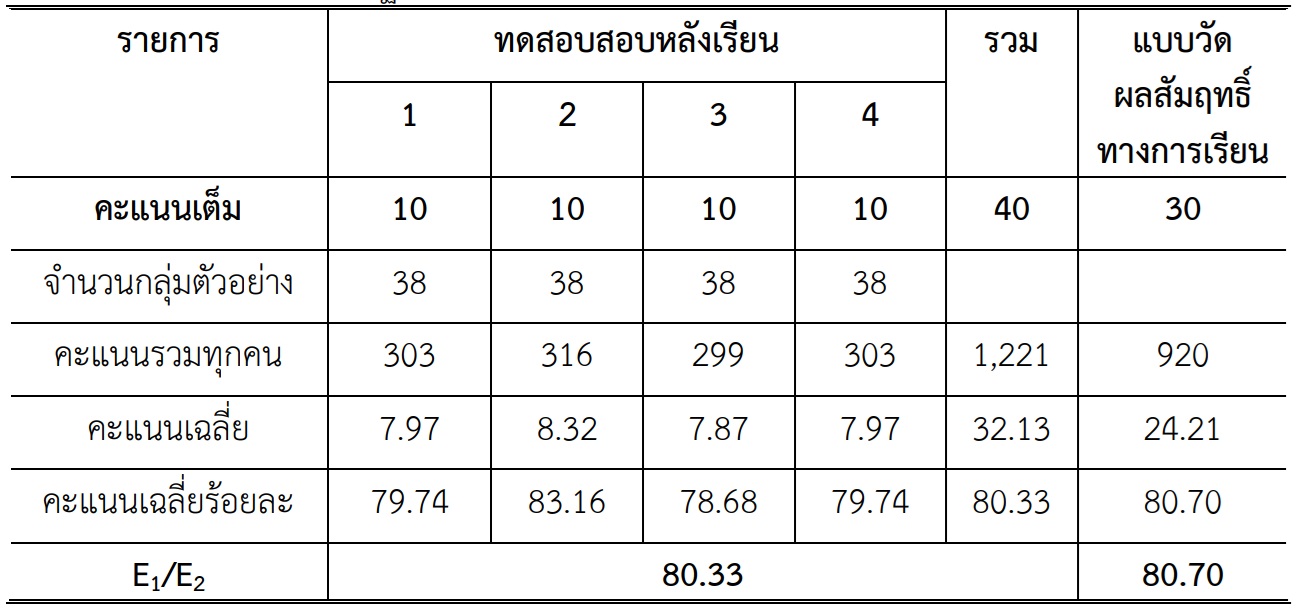Development of mathematics learning activities Using a cooperative learning model STAD techniques that enhance problem-solving skills and mathematics achievement Logic matters For Mathayom 4 students
Main Article Content
Abstract
The objectives of this research are to 1) develop and find out the efficiency of STAD collaborative learning with traditional learning 2) compare academic achievement and problem solving skills using STAD cooperative learning. with normal learning management. 3) Compare academic achievement and problem-solving skills by organizing cooperative learning using the STAD technique before and after learning. 4) Compare academic achievement and problem-solving skills using traditional learning arrangements. before class and after class, and 5) get a format for organizing mathematics learning activities Using the STAD collaborative learning model that enhances problem-solving skills and mathematics 4 academic achievement.
The sample group used in the research was Mathayom 4 students at Phetchabun Provincial Administrative Organization School. (Wang Chomphu Witthayakhom), Mueang District, Phetchabun Province, Semester 1, Academic Year 2022, 2 classrooms, obtained from Simple Random Sampling, then drawn into experimental groups. and control group, 1 room each. As follows:
(1) the experimental group is 38 Mathayomsuksa 4/2 students who received learning through STAD cooperative learning techniques and (2) the control group is 38 Mathayomsuksa 4/3 students. that received normal learning management The tools used in the research consisted of 1) a plan for organizing mathematics learning activities. Using the collaborative learning management model, STAD technique, with normal learning management. Logic matters For Mathayom 4 students and 2) a test to measure academic achievement and mathematical problem-solving skills. Logic matters It is a multiple-choice test with 4 options, 30 questions. Statistics used in data analysis are percentage, mean, and standard deviation. t-test dependent and t-test for independent samples. The results of the research found that: 1) Results of evaluating the quality of mathematics learning activity plans using the STAD collaborative learning model that enhances problem-solving skills and mathematics learning achievement. Logic matters For Mathayom 4 students. From the evaluation of experts, it was found that the mathematics learning activity plan Using the collaborative learning management format STAD technique and normal learning management. Logic matters For Mathayom 4 students, the suitability is at the most appropriate level. has a mean of 4.94 and a standard deviation of 0.21 and the results of finding the efficiency of the mathematics learning activity plan Using the collaborative learning management model, STAD technique, with normal learning management. Logic matters For Mathayom 4 students, there is an efficiency value. / equals 80.33/80.70, which is higher than the set 80/80 criteria and consistent with the set assumptions. 2) Comparative results of academic achievement and problem-solving skills The topic of logic for Mathayom 4 students who received learning through cooperative learning using the STAD technique and normal learning. Before and after studying, it was found that the average between students by organizing Collaborative learning using STAD techniques is higher than traditional teaching. Statistically significant at the .05 level. 3) Results of comparing achievement Studying and problem solving skills Logic matters For Mathayom 4 students, learning is organized through cooperative learning techniques. Before studying and after studying, it was found that students' test scores after studying were significantly higher than before studying at the .05 level. 4) Results of comparing academic achievement and problem solving skills in logic. For Mathayom 4 students who receive learning management by organizing normal learning Before studying and after studying, it was found that students' test scores after studying were significantly higher than before studying at the .05 level. and 5) organizing mathematics learning activities Using the organizing format Collaborative learning STAD techniques that enhance problem-solving skills and mathematics achievement. There are 3 steps of the learning process: (1) the introduction step (2) the teaching step. There are 5 steps of teaching: Step 1, introduction into the lesson, Step 2, group work step, Step 3, testing step. The 4th stage is checking the answer of the test, the 5th stage is the work certification stage, and (3) the summary stage.
Article Details
References
กัญจนา จันทะไพร. 2559. การพัฒนารูปแบบการสอนคณิตศาสตร์ตามแนวทฤษฏีการสร้างความรู้ เพื่อส่งเสริมทักษะการคิดวิเคราะห์ของนักเรียนชั้นประถมศึกษาปีที่ 5 เรื่อง การบวก การลบ และการคูณทศนิยม. KKU Res J HS (GS). 3, 3 (September – December 2015): 1-10.
นภารัตน์ นามบุญลา.2556. การคิดวิเคราะห์และผลสัมฤทธิ์ทางการเรียนคณิตศาสตร์ เรื่องตัวประกอบของจำนวนนับของนักเรียนชั้นประถมศึกษาปีที่ 6 โรงเรียนบ้านนางโทพัฒนา จากการจัดการเรียนรู้แบบกลุ่มร่วมมือ (STAD). กรุงเทพฯ : บัณฑิตวิทยาลัย มหาวิทยาลัยนอร์ทกรุงเทพ.
ธีรวัฒน์ แสงศรี และบรรทม สุระพร. 2560. การศึกษาผลสัมฤทธิ์ทางการเรียนและทักษะการแก้ปัญหาทางคณิตศาสตร์ตามแนวคิดของโพลยาร่วมกับการจัดการเรียนรู้เทคนิค STAD. วิทยานิพนธ์การศึกษามหาบัณฑิต มหาวิทยาลัยอุบลราชธานี. อุบลราชธานี: บัณฑิตวิทยาลัย มหาวิทยาลัยอุบลราชธานี.
วรีรัตน์ พันธุมะโน.2556. การพัฒนาการจัดกิจกรรมการเรียนรู้คณิตศาสตร์ เรื่องกำหนดการเชิงเส้นชั้นมัธยมศึกษาปีที่ 6 ด้วยกลุ่มร่วมมือแบบ STAD. วิทยานิพนธ์. (หลักสูตรและ การสอน) : มหาวิทยาลัยมหาสารคาม.
สถาบันส่งเสริมการสอนวิทยาศาสตร์และเทคโนโลยี. 2556. ผลการประเมิน PISA 2012 คณิตศาสตร์ การอ่านและวิทยาศาสตร์ บทสรุปสำหรับผู้บริหาร. กรุงเทพฯ: สถาบันส่งเสริมการสอนวิทยาศาสตร์และเทคโนโลยี.
สิทธิพล อาจอินทร์. 2554. การพัฒนารูปแบบการจัดการเรียนรู้ที่เน้นการคิดวิเคราะห์ กลุ่มสาระการเรียนวิทยาศาสตร์. วารสารศึกษาศาสตร์ ฉบับวิจัยบัณฑิตศึกษา. 5, 3 (กรกฎาคม - กันยายน 2554):
-168.
สำนักงานปลัดกระทรวงศึกษาธิการกระทรวงศึกษาธิการ. 2560. สรุปการประชุมแผนพัฒนาการศึกษาของกระทรวงศึกษาธิการ ฉบับที่ 12 (พ.ศ. 2560 - 2564). กรุงเทพฯ : โรงพิมพ์คุรุสภา.
อัจฉราพรรณ อาโน. 2555. การจัดการเรียนรู้แบบกลุ่มร่วมมือเทคนิค STAD เพื่อพัฒนาทักษะการสื่อสารทางคณิตศาสตร์ของนักเรียนชั้นประถมศึกษาปีที่ 5. วิทยานิพนธ์. (หลักสูตรและการสอน) : มหาวิทยาลัย
ราชภัฏเชียงราย.


